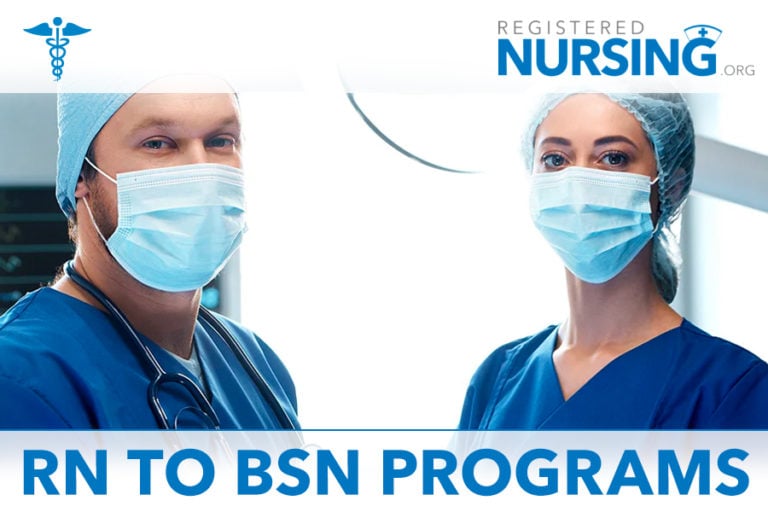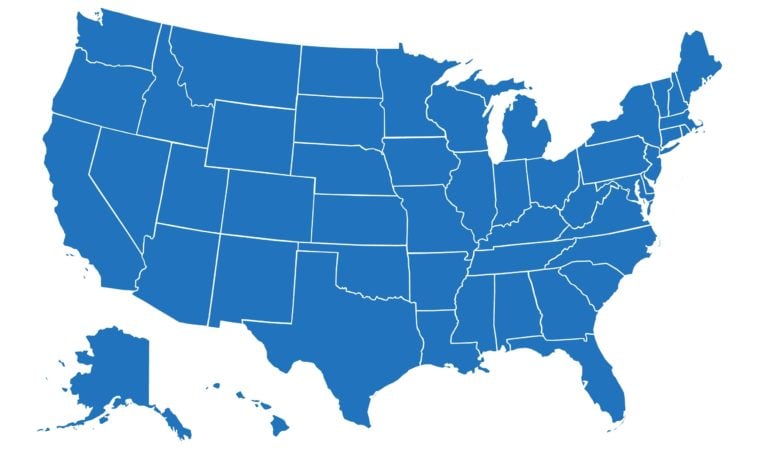Online RN to BSN Programs: What School is Right for You?
- 2026 Best Online RN to BSN Programs
- Find RN to BSN Degree Programs Near You
- How Fast Can I Complete an RN to BSN Degree?
- RN to BSN Degree Program Requirements, Affordability, and Curriculum
- Pros vs. Cons of Online RN to BSN Degree Programs
- RN to BSN FAQs
- Traditional BSN vs. RN to BSN vs. RN to MSN
- Other Popular RN Bridge Programs
- Latest Articles & Guides

Within the last few years, the push to hire bachelor’s educated registered nurses has gained momentum. It seems likely that in the future, a bachelor’s degree will be the minimum education requirement for registered nurses.
For decades, leaders in the field of nursing have encouraged associate’s and diploma-level nurses to pursue a Bachelor of Science in Nursing (BSN) degree. Research has proven that nurses with this degree experience improved job satisfaction, improved patient outcomes, and fewer clinical errors. RN to BSN bridge programs help nurses advance their education in a cost-effective and timely manner.
2026 Best Online RN to BSN Programs
West Chester University of Pennsylvania
West Chester, PA - Public 4-Year - wcupa.edu
RN to BSN - RN-to-BSN Program
Online Learning - Visit Website
West Chester University's RN-to-BSN online program delivers a transformative educational experience for registered nurses seeking career advancement. The fully online, accelerated curriculum enables students to complete their degree in just two semesters with remarkable flexibility. CCNE-accredited and designed for working professionals, the program emphasizes professional development, research methodologies, healthcare ethics, leadership skills, and population health strategies. Students benefit from asynchronous learning, year-round course offerings, and generous credit transfer policies, including CLEP credit acceptance. With a competitive 2.75 GPA requirement, nurses can expand their professional competencies and prepare for enhanced roles in contemporary healthcare environments.
- CCNE-accredited nursing program
- Complete BSN in two semesters
- 100% online asynchronous format
- No charge for transfer credits
- CLEP credits accepted
- Minimum 2.75 GPA required
- 120 total credits needed
- 7-week course sessions
- Year-round course offerings
University of Cincinnati
Cincinnati, OH - Public 4-Year - uc.edu
RN to BSN - RN to Bachelor of Science in Nursing
Online Learning - Visit Website
The University of Cincinnati's online RN to BSN program provides a streamlined educational pathway for licensed registered nurses seeking career advancement. Fully online and designed for flexibility, the program allows nurses to complete their bachelor's degree in 9-18 months without traditional clinical requirements. Featuring only nine nursing courses and six annual start dates, students benefit from affordable tuition at $564 per credit hour. The CCNE-accredited curriculum emphasizes interprofessional learning and offers options in Public Health Nursing and Nurse Educator tracks. Military-friendly and supporting easy credit transfer, this program enables working professionals to progress academically without disrupting their current employment.
- 100% online program
- No clinical requirements
- Only 9 nursing courses
- Six annual start dates
- CCNE accredited program
- Flexible completion time
- Easy credit transfer
- Public Health Nursing option
- Nurse Educator option
- Interprofessional curriculum
Palm Beach State College
Lake Worth, FL - Public 4-Year - palmbeachstate.edu
RN to BSN - Registered Nursing (R.N.) to Bachelor of Science in Nursing (B.S.N.)
Online & Campus Based - Visit Website
Palm Beach State College's RN-BSN hybrid program offers registered nurses a transformative educational journey, strategically designed for associate degree holders. This program uniquely balances online flexibility with comprehensive nursing education, emphasizing evidence-based practice and leadership development. Students gain advanced skills in research methodologies, clinical reasoning, and professional communication. Accredited by the Accreditation Commission for Education in Nursing (ACEN), the curriculum prepares nurses for complex healthcare environments and potential graduate-level studies. The program's hybrid format accommodates working professionals, allowing seamless integration of academic learning with clinical expertise.
- Hybrid learning format
- Minimum associate degree requirement
- ACEN accredited program
- Career advancement focused
- Evidence-based nursing emphasis
University of Utah
Salt Lake City, UT - Public 4-Year - utah.edu
RN to BSN - RN to BSN
Online Learning - Visit Website
The University of Utah's online RN to BSN program offers a comprehensive pathway for licensed nurses seeking career advancement. With a fully online format and 30 total credits, the program emphasizes health promotion and complex healthcare systems. Tailored for working professionals, students benefit from a competitive $400 per credit tuition and multiple start terms. The curriculum supports clinical skill enhancement and leadership development, requiring applicants to hold an associate degree in nursing, current RN licensure, and maintain a minimum 3.0 GPA. Ideal for nurses wanting flexible, career-transforming education without interrupting professional commitments.
- 30 total credits required
- Fully online program format
- $400 per credit tuition
- Geriatric Nursing Leadership emphasis
- Multiple start terms: Fall/Spring/Summer
- Minimum 3.0 GPA requirement
- Nine prerequisite courses needed
- Designed for working RNs
- Clinical capstone in fourth semester
The University of Alabama
Tuscaloosa, AL - Public 4-Year - ua.edu
RN to BSN - RN to BSN
Online Learning - Visit Website
The University of Alabama's online RN to BSN program offers registered nurses a strategic educational pathway with remarkable flexibility. Specifically designed for working professionals, this program enables nurses with an associate's degree or diploma to complete their bachelor's degree entirely online. Requiring just 25 nursing credit hours and maintaining a competitive tuition rate of $385 per credit, students can systematically advance their clinical expertise. The CCNE-accredited curriculum emphasizes critical areas like healthcare informatics, evidence-based practice, and complex client systems. With year-round application acceptance, no ACT/SAT score requirements, and a modest 2.5 GPA prerequisite, the program provides an accessible route for professional development.
- Online flexible format
- 25 nursing credit hours
- $385 per credit hour
- Accredited nursing program
- Year-round application acceptance
- RN licensure required
- No ACT/SAT scores needed
- 2.5 GPA prerequisite
- Annual background check
- Total 126 graduation credits
Auburn University
Auburn, AL - Public 4-Year - auburn.edu
RN to BSN - Nursing, RN to BSN
Online Learning - Visit Website
Auburn University's online RN to BSN program offers registered nurses a strategic pathway to advance their professional credentials. The accelerated program enables associate degree holders to complete their bachelor's degree within three semesters, maximizing flexibility for working professionals. Students with an active RN license can leverage up to 37 transfer credits, expediting their academic progression. The curriculum emphasizes comprehensive nursing practice, integrating evidence-based care, leadership development, and population health strategies. Designed to expand career opportunities, the program requires a minimum 2.5 GPA and focuses on holistic healthcare approaches. No specific entrance exam is mentioned for this online track.
- Online flexible program
- Three-semester completion time
- 37 potential transfer credits
- Minimum 2.5 GPA required
- Current RN license needed
- Upper division nursing courses
- Professional nursing development
- Holistic health approach
- Evidence-based practice focus
- Leadership skill development
Arizona State University
Tempe, AZ - Public 4-Year - asu.edu
RN to BSN - Online RN to BSN
Online Learning - Visit Website
Arizona State University's online RN to BSN program delivers a comprehensive nursing advancement pathway for working professionals. With a dynamic 14-24 month completion timeline, the program uniquely combines flexibility and rigorous academic training. Students benefit from a curriculum focusing on leadership, evidence-based practice, and healthcare innovation. The program requires an active RN license and minimum 2.50 transfer GPA, ensuring participants have foundational nursing expertise. Online coursework spans 36 credit hours across 10 classes, with each course lasting 7.5 weeks. The program distinctively prepares nurses for expanded professional roles, emphasizing critical thinking, cultural competence, and interprofessional collaboration without designating the diploma as an online credential.
- Online flexible learning format
- 14-24 month completion time
- 36 total credit hours
- 10 total classes
- 7.5 weeks per class
- Active RN license required
- Minimum 2.50 transfer GPA
- Accredited nursing curriculum
- No online designation on diploma
University of Florida
Gainesville, FL - Public 4-Year - ufl.edu
RN to BSN - RN to BSN
Online Learning - Visit Website
University of Florida's RN to BSN online program offers a dynamic educational pathway for practicing registered nurses seeking career advancement. Tailored for RNs with associate degrees, this program emphasizes flexible learning and professional development. Students engage in comprehensive virtual simulations and community-based clinical experiences, totaling 90 clinical hours. The curriculum focuses on enhancing analytical skills, leadership competencies, and strategic healthcare knowledge. Notably military-friendly and featuring a hospital on campus, the program maintains a 2.8 GPA requirement. Prospective students should possess an active RN license and are positioned to potentially pursue advanced graduate nursing education through this affordable, high-quality online program.
- Fully online, part-time program
- Requires active RN license
- 90 total clinical hours
- Minimum 2.8 GPA requirement
Northeastern University
Boston, MA - Private 4-year - northeastern.edu
RN to BSN - RN-to-BSN Program
Online Learning - Visit Website
Northeastern University's fully online RN-to-BSN program provides a dynamic educational pathway tailored for working registered nurses seeking degree advancement. Uniquely structured to accommodate professional schedules, students can complete the program part-time in two years or accelerate their studies in a single year. The curriculum emphasizes critical decision-making skills through over 200 interactive learning activities, preparing nurses for expanding healthcare roles. With no specific concentration noted, the program offers comprehensive nursing education designed to meet increasing industry demands. As a military-friendly institution, Northeastern supports professional nurses in achieving their academic and career development goals. No specific entrance exam requirements are mentioned for this online program.
- Online flexible degree completion
- Part-time or full-time options
- Over 200 online learning activities
- Supports career advancement
- Designed for working RNs
Florida Agricultural and Mechanical University
Tallahassee, FL - Public 4-Year - famu.edu
RN to BSN - RN-BSN Program
Online Learning - Visit Website
Florida A&M University's online RN-BSN program delivers a comprehensive educational pathway tailored for working registered nurses seeking academic advancement. As a historically Black university (HBCU), the program offers unique flexibility with asynchronous coursework that can be completed in 3 full-time or 5 part-time semesters. Designed for licensed nurses from accredited associate or diploma programs, students benefit from 30 required credit hours at FAMU, national accreditation, and strategic preparation for graduate nursing studies. The curriculum emphasizes professional skill enhancement and expanding career opportunities across diverse healthcare environments, making it an attractive option for nurses looking to elevate their professional credentials.
- Online asynchronous courses
- Complete in 3 semesters full-time
- Credit for prior nursing education
- Nationally accredited program
- Full or part-time study options
- 30 credit hours at FAMU required
- Prepares for graduate nursing study
We have curated 300+ RN to BSN program listings across the country. See options near you by selecting your state below.

- AL Alabama
- AK Alaska
- AZ Arizona
- AR Arkansas
- CA California
- CO Colorado
- CT Connecticut
- DE Delaware
- DC Washington, DC
- FL Florida
- GA Georgia
- HI Hawaii
- ID Idaho
- IL Illinois
- IN Indiana
- IA Iowa
- KS Kansas
- KY Kentucky
- LA Louisiana
- ME Maine
- MD Maryland
- MA Massachusetts
- MI Michigan
- MN Minnesota
- MS Mississippi
- MO Missouri
- MT Montana
- NE Nebraska
- NV Nevada
- NH New Hampshire
- NJ New Jersey
- NM New Mexico
- NY New York
- NC North Carolina
- ND North Dakota
- OH Ohio
- OK Oklahoma
- OR Oregon
- PA Pennsylvania
- RI Rhode Island
- SC South Carolina
- SD South Dakota
- TN Tennessee
- TX Texas
- UT Utah
- VT Vermont
- VA Virginia
- WA Washington
- WV West Virginia
- WI Wisconsin
- WY Wyoming
How Fast Can I Complete an RN to BSN Degree?
The general requirement for an RN to BSN program is 120 total credit hours, which includes undergraduate hours already completed during the student’s prior associate's degree program.
For most students, an RN to BSN program consists of around 30 credits of upper-level courses. Depending on your attendance schedule and the number of transferable credits you bring, this can take anywhere from two to four consecutive semesters (or 8 to 24 months on average) to complete.
The breakdown is generally:
- 60 undergraduate credit hours (which is the associate's degree you already have)
- 30 upper-level BSN courses
- Most schools will require employment as an RN while enrolled in the program.
Check out some of the fastest RN to BSN program options.
RN to BSN Degree Program Requirements, Affordability, and Curriculum
While specific RN to BSN program requirements will vary by school, some basics most schools will share are:
- Graduate of an accredited ADN or nursing diploma program
- Active, unencumbered RN Licensure
- Criminal background check and/or drug test
- Completion of general admission criteria, including minimum GPA (usually 2.0 or above) and prerequisite courses
- Full-time RN employment or equivalency exams – about 30 hours of clinical hours or equivalency exams are required; full-time working RNs will often have this satisfied already, but exams can also be utilized; check with your school’s advisor for clarification.
How Affordable are RN to BSN Programs?
RN to BSN program tuition and costs will depend on the city/state and school type and are always subject to change. It’s a good idea to check with each school regarding current tuition rates before enrolling to get a fuller picture of what you can expect. The good news is that RN to BSN programs are usually much cheaper than traditional 4-year BSN programs. On average, RN to BSN costs typically range from $8,000 to $30,000, depending on various factors, including:
- The type of institution (public vs. private)
- The program’s delivery format (online vs. in-person)
- Residency status (in-state vs. out-of-state tuition)
- Additional mandatory fees such as technology, lab, and textbook costs
RELATED: Discover some of the Top Affordable RN to BSN Programs.
What Classes Are Required for an RN to BSN Program?
RN to BSN programs build on the knowledge and experience nurses need to help grow in critical thinking, leadership, and clinical skills.
Whether nurses are seeking to advance in their current role or explore other areas, nursing programs are designed to equip nurses with the knowledge and training they need to excel.
RN to BSN program curriculum varies by school, but generally includes courses such as:
- Community Health Nursing
- Evidence-Based Practice
- Statistics for Nurses
- RN Collaborative Healthcare
- Nursing Management
- Healthcare Informatics
- Nursing Ethics
- Nursing Leadership
- Nutrition
Pros vs. Cons of Online RN to BSN Degree Programs
There are many online RN to BSN degree programs available for nurses who want to take the next step in their careers. Online programs have grown in popularity in recent years due to their flexibility and convenience, particularly for working nurses and those with familial obligations.
Not sure if you want to enroll in an online or campus-based degree program? Consider some of the pros and cons of online RN to BSN programs below.
Advantages of Online RN to BSN Programs
- Flexibility - Online RN to BSN programs often allow students to complete coursework anytime and from any location.
- Cost-Effectiveness - Online programs often have lower tuition rates and eliminate commuting, parking, and campus housing costs. They are often designed for working RNs so they can continue earning an income while enrolled.
- Technological Proficiency - Online learning helps you become more proficient with digital tools and technology, which are increasingly important in healthcare settings.
- Diverse Learning Resources - Online programs provide access to many digital resources, including recorded lectures and interactive forums. They also allow students to network and collaborate with peers from any geographic location.
- Self-Paced Learning - Many online programs allow you to progress through the material at a pace that suits your learning style and schedule.
Disadvantages of Online RN to BSN Programs
- Limited Hands-On Experience - While not always required, online programs may offer fewer opportunities for in-person clinical practice. While virtual simulations may be available, they are often not as robust as on-campus simulation labs.
- Self-Discipline Required - Successful completion of an online program requires strong self-discipline and time management skills to keep up with coursework and deadlines. Those who struggle with procrastination may find it difficult to stay motivated.
- Technology Dependence - Reliable internet access and up-to-date technology are essential, and technical difficulties can disrupt your studies. If you struggle with navigating technology, there may be a steep learning curve in utilizing digital tools.
- Less Peer Interaction - Some students may feel isolated without the social interaction of a campus-based program and limited face-to-face time with instructors and classmates.
- Accreditation and Reputation - Not all online RN to BSN programs are created equal. It’s important to ensure that the program is accredited and has a good reputation to ensure that future employers respect the degree. Learn more about nursing school accreditation.
RN to BSN FAQs
For the registered nurse who enjoys the field of nursing and wishes to either:
- Stay competitive in the field
- Learn even more about how to be a great nurse and help people, or
- Wishes to shift gears to a non-clinical position
The answer is “absolutely!”
Some great organizations offering nursing scholarships and/or grants include:
- National Institutes of Health (NIH) Undergraduate Scholarship Program (UGSP)
- Nurse Corps Scholarship Program
- Gates Millennium Scholars Program
- Minority Nurse Scholarship List
- HRSA Health Workforce
- NLN Nursing Education Scholarships
- The Foundation of the National Student Nurses' Association Scholarships
- Barbara Rhomberg Excellence in Nursing Scholarship
- Meland Foundation Nursing Scholarship
Students have many options when it comes to paying for an RN to BSN program, all with their own advantages and drawbacks. Be sure you fully understand your options, and don't be afraid to contact your school's financial aid office for additional information. Common payment methods include:
- Scholarships and grants - often merit-based and don't need to be paid back, but students must maintain a minimum academic GPA.
- Loans - Federal or private loans are available, but students must be prepared to pay them back with interest.
- Cash - If you have the funds upfront or are utilizing help from family or friends.
- Payment plans - Ask your school for more information on payment plan options.
- Tuition reimbursement - Ask your current employer if they offer a tuition reimbursement plan, but be mindful of any stipulations (i.e. having to commit to working for them for a certain amount of time after graduating).
Clinical hours are not typically required for the RN to BSN degree program due to the fact that the student would have already completed the required clinical hours in order to become licensed. However, there are RN to BSN programs that do include clinical learning modules to enhance nursing skills. It's always a good idea to check the specific requirements of any RN to BSN program you may be considering to see exactly what the curriculum entails.
Yes! And not only can you work, but most schools require it!
Maintaining full-time employment as a registered nurse during the RN to BSN program is encouraged by most schools. Not only does this satisfy the 30 “clinical hours” requirement of many RN to BSN programs, but it allows for the nurse to take advantage of the employer's tuition reimbursement programs and qualify for certain nursing scholarships and grants.
Many registered nursing positions are waiting to be filled throughout the country’s healthcare facilities. For many years, the nursing community has been pushing to eliminate the Associate’s Degree in Nursing (ADN) in favor of the Bachelor's of Science in Nursing (BSN).
Major reasons for this shift to higher education include:
- Research to support better patient outcomes by RNs with a BSN
- Increasing availability of BSN programs and RN to BSN bridge programs
- Europe, New Zealand, and Australia already require a BSN for entry-level RN jobs
- Highly complex healthcare environment requires higher education
- More opportunities for nurses to advance, hold leadership roles, and specialize with a BSN-level degree
Traditional BSN vs. RN to BSN vs. RN to MSN
Find out how an RN to BSN program compares to two other popular nursing degree pathways: the traditional BSN and the RN to MSN.
| Traditional BSN | RN to BSN | RN to MSN | |
|---|---|---|---|
| Target Audience | High school graduates or transfer students | Registered Nurses (RNs) with an Associate’s Degree or Diploma | RNs with an Associate’s Degree or Diploma |
| Duration | 4 years (full-time) | 1-2 years (full-time or part-time) | 2-3 years (full-time or part-time) |
| Entry Requirements | Intensive clinical practice often includes advanced practice experiences | Current RN license, Associate’s Degree or Diploma in Nursing | Current RN license, Associate’s Degree or Diploma in Nursing |
| Curriculum Focus | Comprehensive nursing education, general education courses | Advanced nursing courses, leadership, and management, community health | Advanced nursing courses, leadership, management, specialized tracks (e.g., Nurse Practitioner, Nurse Educator) |
| Clinical Practice | Extensive clinical rotations throughout the program | Limited clinical practice, often based on current RN work | Advanced nursing roles, leadership positions, and higher salary potential |
| Mode of Delivery | Popular on-campus but online/hybrid options available (check out online BSN programs) | Online, hybrid, or in-person | Online, hybrid, or in-person |
| How Affordable? | Higher overall cost due to longer duration | Lower cost due to shorter duration and online options | Higher cost, but varies with online or hybrid options and specialization |
| Outcome Degree | Bachelor of Science in Nursing (BSN) | Bachelor of Science in Nursing (BSN) | Master of Science in Nursing (MSN) |
| Career Opportunities | Entry-level nursing positions, eligibility for RN licensure | Advanced practice roles (e.g., Nurse Practitioner, Clinical Nurse Specialist), leadership positions, and higher salary potential | Advanced practice roles (e.g., Nurse Practitioner, Clinical Nurse Specialist), leadership positions, higher salary potential |
| Licensure Preparation | Prepares for NCLEX-RN | Already licensed as an RN, no additional licensure required | Prepares for advanced practice certification exams depending on specialization |
| Flexibility | Less flexible, fixed schedule and location | Highly flexible, accommodates working RNs | Flexible, accommodates working RNs, but more demanding than RN to BSN |
| Advancement Potential | Foundation for advanced nursing education (e.g., MSN, DNP) | Pathway to MSN or other advanced degrees | Direct entry into advanced nursing roles and higher education (e.g., DNP, PhD) |
Read More: RN to BSN vs. Direct-Entry BSN: Which is Best For You?
Other Popular RN Bridge Programs
Nursing bridge programs exist at many different levels. Learn more about some of the other RN bridge programs students are enrolling in.

LPN to RN
If you're a current Licensed Practical/Vocational Nurse (LPN/LVN), there's a specific pathway to help you reach your RN goals. Consider the LPN to RN or the LPN to BSN.
RN to MSN
Are you an ADN or diploma-educated RN and know you want to earn your Master's of Science in Nursing (MSN) degree? Skip the BSN and go right into an RN to MSN program.
RN to NP
Dreaming of becoming a Nurse Practitioner (NP)? If you are already an RN, consider the convenient RN to NP bridge program pathway.
BSN to DNP
If you have a BSN in hand and wish to pursue a doctoral nursing degree, the BSN to DNP pathway may be right for you.
Latest Articles & Guides
One of the keys to success as a registered nurse is embracing lifelong learning. Our articles and guides address hot topics and current events in nursing, from education to career mobility and beyond. No matter where you are on your nursing journey, there’s an article to help you build your knowledge base.
Browse our latest articles, curated specifically for modern nurses.



